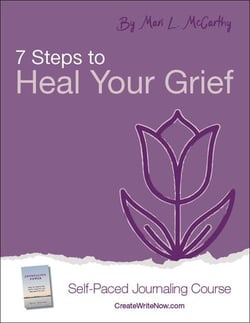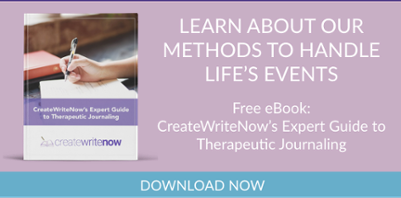Have you ever made a big mistake with irreversible, negative consequences? If so, you’re not alone.
Most of us have messed up at some point of our lives- and lived to regret our actions.
But beating ourselves up isn’t going to help. Regret is a debilitating emotion which produces chronic mental and physical stress as we ruminate over what we should or shouldn’t have done.
Sometimes it’s our failure to take positive action in a situation that haunts us for years after the event. Either way, regret will steal our joy and shipwreck our future if we allow it.
Therapeutic writing can help us move past regret into a positive, abundant life where we can embrace our real purpose and destiny.
But first, let’s look a little more closely at what regret really is.
Regret is a form of grief in which you blame yourself for the loss of something or someone of great value. It can involve feeling angry, anxious, guilty or ashamed, as well as sad.
You can only experience regret when you believe you could have done something to change an outcome; perhaps acted differently, spoken up, kept quiet, or made a better choice.
Typical areas of regret include missed opportunities for love, poor career choices, lifestyle choices that have impacted health, failing to spend time with loved ones, or giving up on youthful dreams and ambitions.
Writing Therapy Comes To The Rescue
Do you suffer personally with deep feelings of regret? If so, it’s time for some writing therapy! You can banish those accusing voices and move on, whatever your age and situation.
So in your journal, write down your biggest regret in life. What happened, who was involved, and how does that outcome affect you or other people now? Is there a pattern of behaviour that you need to change? Unpack your emotions and identify your motivations.
As you continue journaling, ask yourself: What did I learn from this experience? What would I do differently if I was in a similar situation in future? There’s always a lesson that can be learned when we’ve made a serious mistake. Regret can have a positive outcome- for example, it’s one major reason why drug addicts and alcoholics decide to go into recovery!
Once you’ve worked out what the lesson is, you need to deal with any self-directed shame, guilt or anger. Often we are very hard on ourselves, particularly over mistakes we made many years ago. We need to remember that we are much older and wiser now. We have gained a lot more knowledge and information, but we keep beating ourselves up because we did not know it all then.
It’s vitally important that you grasp this point, and accept that whatever you did what seemed right at the time, based on the knowledge you had. And if you think what you did was deliberately selfish and hurt others, then ask yourself, am I truly sorry? If you are genuinely repentant, just resolve to behave better in future.
It helps to believe that forgiveness is available to those who truly regret their misdeeds. If you believe in something out there (even if you don’t have a strong faith) ask for forgiveness. Believe it’s a done deal, let go of the past, and move on.
Forgiving yourself isn’t always easy (many people agree on this) but it’s absolutely vital. Unless you grant yourself absolution you will remain in a prison of regret.
Try These Journaling Tips and Techniques
It might help the process if you write a letter to your younger self in your journal, putting the whole incident into perspective, and reassuring the younger You that all is forgiven and you are now at peace. I once wrote such a letter from Big Lyn to Little Lyn. I find this type of expressive writing very healing.
Now write some affirmations in your journal; statements to encourage yourself to move on.
You might write:
- I am human and make mistakes, and that is OK
- I have learned from my past, and I deserve to be happy again
Once you have written some affirmations, read them out loud.
It also helps to turn your disappointments into statements of gratitude, for example, you could change “I can’t believe I crashed my car and ended up in the hospital” to “I’m so thankful I got out alive and no-one else was hurt”.
Now take the pages that you wrote about your greatest regret and burn or shred them. As you destroy the page, resolve that you will not allow your mind to return to the episode again and again. When your mind wanders back to it, be firm with yourself and say: “That issue is resolved and I am looking forward to a great future”.
Promise yourself you will make the most of life from now on. The worst regrets of all involve missed opportunities, so live life fully, laugh with friends, spend time with loved ones, try new things, work hard to achieve your goals. Expressive writing will help you dream bigger dreams, develop talents that you can use and think of new places to go; keep journaling and embrace everything that life has for you.
This self-paced journaling course, 7 Steps to Heal Your Grief, might help you out.

Do you find yourself dwelling on missed opportunities? Or perhaps you're having trouble making sense of it all? Please download our free ebook, CreateWriteNow's Expert Guide to Therapeutic Journaling, shows you journaling can provide the tools you need to achieve the happiness we all deserve.

About
 Lyn Alderson is a professional journalist, blogger and author, based in the English Midlands.
Lyn Alderson is a professional journalist, blogger and author, based in the English Midlands.
She has 25 years’ experience of writing news and features for UK newspapers and magazines.To find out more about Lyn and her work visithttp://lacopywriting.co.uk
If you want to find out more about the health benefits of keeping a journal, check out Lyn's e-book The Write Therapy: How Keeping a Journal Can Make You Happier, Healthier and More Productive available from the Amazon Kindle Store.
 Lyn Alderson is a professional journalist, blogger and author, based in the English Midlands.
Lyn Alderson is a professional journalist, blogger and author, based in the English Midlands.



Leave Comment